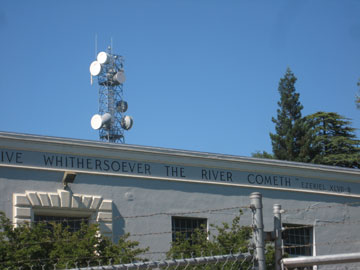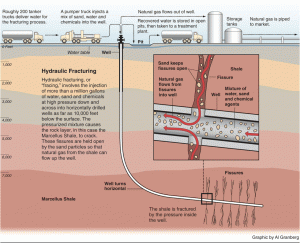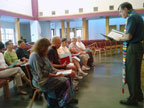This piece is part of the New Mexico installment of the “Advocating on the Road” blog series.
By Ruth Hoffman, Director Lutheran Office of Governmental Ministry– New Mexico
Our first stop on the Advocacy Road Trip is New Mexico, where congregations and ministries of the Evangelical Lutheran Church in America (ELCA) continue to walk with their many neighbors experiencing hunger and living in poverty.
New Mexico is a large state with a diverse geography and population, both urban and rural. About 2 million people live here, the majority of whom are members of minority groups — 46% of New Mexicans are Latino, 9% Native American (identifying with 22 tribes), 2% are African American, and 1.5% Asian.
Consistently, New Mexico ranks as a state with an extremely high percentage of its people living in poverty. The 2010 census placed the state’s poverty rate at 20.4%, which is the second highest in the nation. More alarming is the rate of children living in poverty at 30%, ranking third in the U.S. These high levels of poverty inevitably lead to extreme hunger throughout New Mexico. Approximately 15% are “Food Insecure” meaning that access to food is limited by lack of money or other resources. Nearly 6% are living with “Very Low Food Security” which means that food intake of some household members is reduced and normal eating patterns are disrupted due to limited resources.
In response to the widespread poverty and hunger in New Mexico, ELCA congregations learn, serve and advocate. Through a variety of educational opportunities, congregations explore how we are called to be followers of Jesus in light of the context in which we live. They also learn about the needs of many New Mexicans by engaging in a wide range of service to their neighbors living in poverty.
One example is ELCA congregations in Albuquerque, including St. Timothy, St. Luke and All Saints, who regularly welcome and host families experiencing homelessness overnight at their churches and assist them toward family sustainability through the Family Promise program. Another congregation, Peace Lutheran in Las Cruces, supports and sponsors the Border Servant Corps, which annually brings young volunteers to serve in agencies working to address poverty in Las Cruces and in El Paso, Texas.
Many ELCA members and congregations, like Christ Lutheran in Santa Fe and Holy Cross in Albuquerque, prepare meals and provide food to people who are hungry. St. Peter in Carlsbad is one of our congregations who help to build homes for families in Juarez, Mexico, through Casas por Christo. For many years, St. Paul in Albuquerque has partnered with the Martineztown neighborhood through service and advocacy. Bethlehem in Las Cruces actively supports the Navajo Lutheran Mission. These are but a few of the ways that our congregations serve their neighbors through work that is a central part of their ministries.
Several years ago, congregations in New Mexico realized that advocacy was integral in addressing the deeply imbedded issues of poverty and hunger in the state. Building on the direct services provided in their communities, ELCA members worked to form advocacy ministries. In 1984, the New Mexico state public policy office in Santa Fe opened. The ELCA Rocky Mountain Synod has consistently supported this advocacy ministry as an intentional ministry of the synod and a witness to God’s love. ELCA congregations throughout New Mexico have become involved in advocacy in response to the needs that they have seen when they serve their communities and neighbors. ELCA pastors and lay leaders encourage their members to become active advocates. Lutheran Advocacy Ministry-New Mexico continues to focus its work primarily on public policies that can have a positive impact on people living in poverty and with hunger.
A direct result of this advocacy is the creation of a state Housing Trust Fund to increase the availability of affordable housing with about 1,400 units built so far. ELCA members have joined the Advocacy Network to learn about the ways that changes in public policy can help to address poverty and hunger. Pastors and congregations invite the Lutheran Advocacy Ministry-New Mexico director to come to their congregations to talk about advocacy opportunities and to provide opportunities for members to join the Advocacy Network.
The Rocky Mountain Synod, ELCA congregations in New Mexico and Lutheran Advocacy Ministry-New Mexico will continue learn about, serve and advocate for our neighbors living in hunger and poverty.







